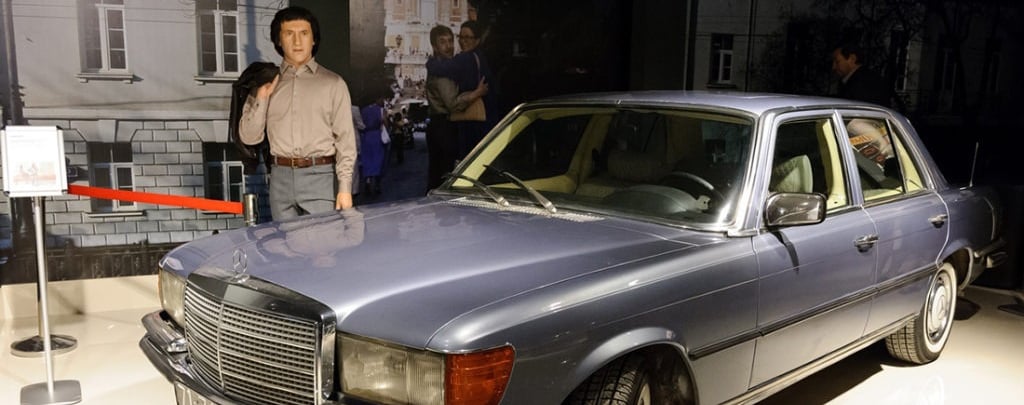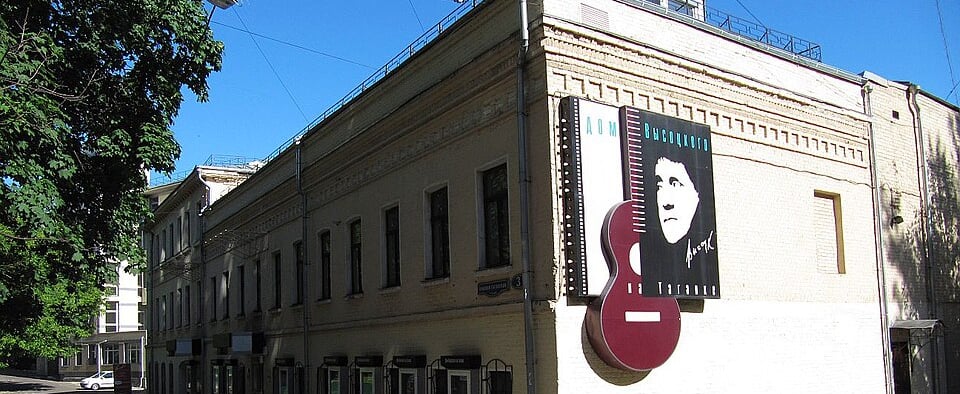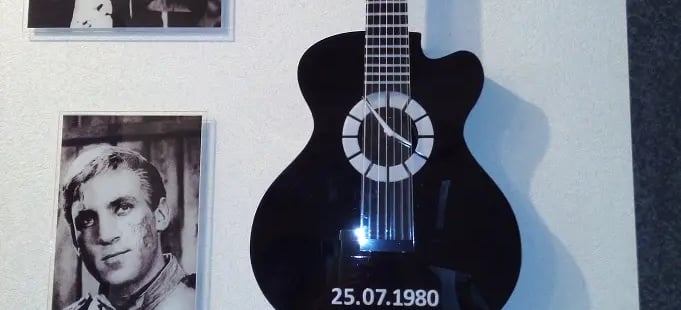Vysotsky Cultural Center: The Voice That Refuses to Fade
Honoring the legendary bard Vladimir Vysotsky, this center in Moscow keeps his rebellious spirit alive through concerts, exhibitions, and poetic tributes.


A House for a Legend
In a quiet courtyard off Taganka Square, far from the gleaming towers of modern Moscow, there is a place where the voice of Vladimir Vysotsky still resonates — low, raw, defiant, tender.
This is the Vysotsky Cultural Center, a living monument to the most beloved bard and one of the most restless spirits of Soviet Russia.
Here, behind modest walls, the life and art of Vysotsky — actor, poet, singer, and voice of the people — is kept alive not in marble but in song, memory, and dialogue. It is a place where visitors come not only to remember, but to listen, to feel, and to reflect on the enduring power of art that speaks the truth.
The Spirit of Vysotsky
There is no figure in Russian 20th-century culture quite like Vladimir Vysotsky (1938–1980).
Officially, he was an actor of the Taganka Theater. Unofficially, he was a folk hero, whose gravel-voiced songs and fierce poetry spread across the Soviet Union in pirated tapes and word of mouth, giving voice to the inarticulate hopes, ironies, and despairs of a society stifled by censorship.
His songs spoke of prisoners and soldiers, lovers and outcasts, heroes and fools. They were brutally honest, often darkly funny, always deeply human.
Though he died young, at just 42, his work became a kind of underground national conscience — and continues to resonate with new generations across Russia and beyond.
A Museum Grown from Love
The Vysotsky Cultural Center was born not of state decree but of love and public demand.
For years after Vysotsky’s death, there was no official space to honor his legacy. Fans, friends, and fellow artists kept his memory alive in gatherings, performances, and informal archives.
In 1987, a small Vysotsky Museum was opened within the Taganka Theater, thanks to the efforts of his widow, Marina Vlady, and a devoted circle of supporters. Over time, this initiative grew into the Vysotsky Cultural Center, which today encompasses a museum, archive, performance space, and educational forum — all housed near the theater where Vysotsky made his name.
The center remains an independent, living institution, dedicated not only to preservation but to creative dialogue.
A Journey Through a Life
Visiting the Vysotsky Cultural Center is like stepping into the heart of the bard’s world.
The permanent exhibition is both intimate and evocative. One moves through rooms that trace Vysotsky’s life: his childhood, his years at the Moscow Art Theater School, his struggles and triumphs at Taganka, his tumultuous marriage to Marina Vlady, and his unstoppable drive to write, sing, and perform — despite illness, censorship, and official hostility.
The rooms overflow with artifacts: handwritten lyrics, photographs, recordings, costumes, stage props, personal belongings. One sees the guitar whose strings he broke in performance, the notebooks filled with urgent scrawl, the cigarette-stained microphone through which he poured his voice into the void.
But more than objects, it is the spirit of Vysotsky that fills the space — carried in the rough recordings that play softly in the background, in the haunting black-and-white film clips, in the eyes of visitors who come not as tourists but as pilgrims.
Practical Information
Location
Vysotsky Cultural Center
Nikoloyamskaya Street, 23, Bldg. 3
Moscow, Russia
The center is located a short walk from Taganka Square and the Taganka Theater, in the heart of one of Moscow’s most historic neighborhoods.
Opening Hours
Tuesday to Sunday: 12:00 – 19:00
Closed on Mondays.
Performance times for concerts and special events vary; evening events often begin at 19:00 or 20:00.
Admission
General admission to the museum: modest fee.
Discounts available for students, seniors, and groups.
Tickets for concerts, screenings, and special programs sold separately; advance booking recommended for popular events.
Getting There
Metro: Nearest stations include Taganskaya (Circle Line and Tagansko-Krasnopresnenskaya Line) and Marksistskaya.
Public transport: Numerous bus and trolleybus routes serve the Taganka area.
By foot: The center is easily reached from the Taganka metro stations.
Facilities and Services
Permanent exhibition dedicated to the life and work of Vladimir Vysotsky.
Concert hall with regular performances and readings.
Screening room for films and archival footage.
Bookstore with Vysotsky-related literature, recordings, and memorabilia.
Guided tours available in Russian; English-speaking guides can be arranged upon request.
Wheelchair accessibility: partial — inquire in advance for details.
Café and lounge area available during concerts and special events.
Events
Regular bard concerts and Vysotsky tribute evenings.
Screenings of documentaries and feature films related to Vysotsky and Soviet cultural history.
Theatrical performances inspired by Vysotsky’s work and spirit.
Poetry readings, literary discussions, and public lectures.
Annual commemorative events around Vysotsky’s birthday (January 25) and date of passing (July 25), drawing artists and admirers from across Russia.
Official Website
https://vysotsky.center
(Available in Russian; includes event calendar and ticketing.)


A Living Cultural Space
The Vysotsky Cultural Center is not a static memorial but a place of living culture.
Throughout the year, the center hosts concerts, theatrical performances, film screenings, and poetry readings, often featuring works by Vysotsky himself or artists influenced by his legacy.
The intimate concert hall reverberates with the sound of guitar and voice, as performers reinterpret Vysotsky’s songs or present new works in the bardic tradition. Young musicians, seasoned actors, and poets from across Russia and abroad take the stage, ensuring that the center remains a vital part of Moscow’s cultural life.
Educational programs, including lectures, workshops, and discussions, draw a wide public — from schoolchildren discovering Vysotsky for the first time to lifelong fans exploring new dimensions of his work.
In this way, the center fulfills its mission: not to freeze Vysotsky in history, but to let his voice continue speaking to the present.
The Universal Voice
What is it about Vysotsky that still resonates so powerfully today?
The answer lies in his deep humanity. His songs were never propaganda or polite art; they were the raw outpouring of a man who refused to lie. They spoke to the real experiences of ordinary people — their griefs, loves, ironies, and stubborn joys.
In a time of conformity, he dared to be himself. In a culture of silence, he sang out.
That courage, that unvarnished honesty, continues to inspire artists and audiences alike. Visitors to the Vysotsky Cultural Center do not come only to honor a figure of the past — they come to renew their own connection with the spirit of resistance, humor, and truth that Vysotsky embodied.
His voice refuses to fade — and in these rooms, it lives anew.
The Visitor’s Experience
To visit the Vysotsky Cultural Center is to experience both a personal journey and a collective memory.
The atmosphere is one of intimacy. Visitors are encouraged to linger, to listen, to read the fragments of poetry on the walls, to sit with the sound of Vysotsky’s voice — rough, urgent, unforgettable — echoing through the rooms.
Many come alone; others arrive in small groups of friends or family. It is common to see visitors quietly weeping before a faded photograph or softly singing along to a familiar refrain.
The center invites this kind of response — not a distanced appraisal, but a shared emotional encounter with a man whose songs still speak to the universal human heart.




